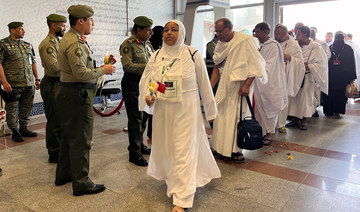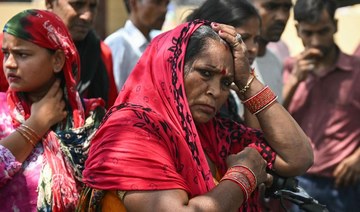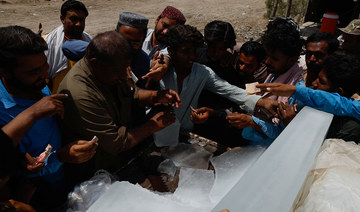MOSCOW: President Vladimir Putin has ordered the Russian military to hold nuclear weapons drills involving the navy and troops based near Ukraine, the defense ministry said Monday.
Putin has upped his nuclear rhetoric since the Ukraine conflict began, warning in his address to the nation in February there was a “real” risk of nuclear war.
“During the exercise, a set of measures will be taken to practice the preparation and use of non-strategic nuclear weapons,” the defense ministry said.
Non-strategic nuclear weapons, also known as tactical nuclear weapons, are designed for use on the battlefield and can be delivered via missiles.
The ministry said the exercises would take place “in the near future” and were aimed at ensuring Russia’s territorial integrity in the face of “threats by certain Western officials.”
Aircraft and naval forces will take part, as well as troops from the Southern Military District, which borders Ukraine and includes the occupied Ukrainian territories, it said.
Western officials have become increasingly alarmed by the Kremlin’s nuclear rhetoric during the offensive in Ukraine, with Putin frequently invoking Russia’s nuclear doctrine.
Last year Russia ditched its ratification of the Comprehensive Nuclear Test Ban Treaty and pulled out of a key arms reduction agreement with the United States.
Russia’s president Putin orders nuclear drills with troops near Ukraine
https://arab.news/6tvz9
Russia’s president Putin orders nuclear drills with troops near Ukraine

- Putin has upped his nuclear rhetoric since the Ukraine conflict began, warning in his address to the nation in February there was a ‘real’ risk of nuclear war
Russia invites Taliban to top economic forum in June, TASS reports

TASS reported on Monday that Russian ministries advised Putin that Moscow could remove the Taliban from its listed of banned organizations.
Philippines protests China’s annual fishing ban

- China imposes an annual fishing ban on South China Sea waters and the Philippines routinely opposes it
- China claims almost the entire South China Sea, a conduit for more than $3 trillion in annual ship commerce
The annual imposition of a fishing ban raises tensions in the South China Sea, the foreign ministry said, calling on Beijing to “cease and desist” from “illegal actions” that violate the Philippines’ sovereignty and sovereign rights.
China imposes an annual fishing ban on South China Sea waters and the Philippines routinely opposes it. This year’s ban is expected to last until September.
The Philippines’ foreign affairs department (DFA) has protested the ban through a diplomatic note, saying the fishing moratorium covers waters within its maritime zones.
“The Philippines stressed that the unilateral imposition of the fishing moratorium raises tensions in the West Philippine Sea and the South China Sea,” the DFA said in a statement.
China’s embassy in Manila did not immediately respond to a request for comment.
Philippine Defense Secretary Gilberto Teodoro last week said China’s rules about how its Coast Guard can operate in the South China were a
“provocation.”
China claims almost the entire South China Sea, a conduit for more than $3 trillion in annual ship commerce. Its territorial claims overlap with waters claimed by the Philippines, Vietnam, Indonesia, Malaysia and Brunei.
In 2016, an international arbitral tribunal said China’s claims had no legal basis, a decision Beijing has rejected.
Indonesia’s Mountain Ibu erupts as agency warns local aviation authorities
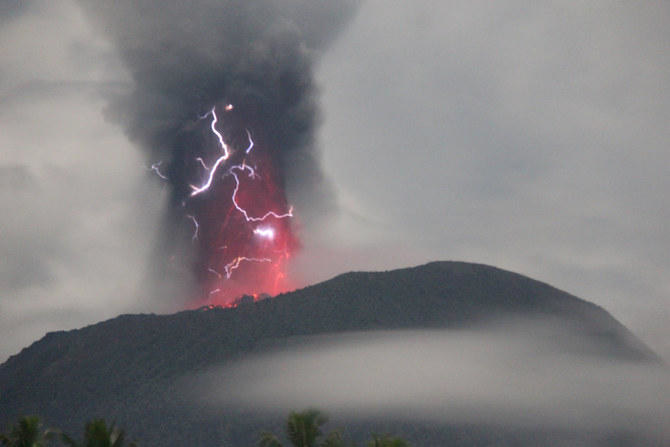
- This follows a series of eruptions this month after authorities noticed an uptick of volcanic activity since April
JAKARTA: A volcano on the remote Indonesian island of Halmahera erupted on Monday spewing a grey ash cloud six km (four miles) into the sky, the country’s volcanology agency said, adding it had issued a warning for aviation authorities managing local flights.
This follows a series of eruptions this month after authorities noticed an uptick of volcanic activity since April, leading to evacuations of people from seven nearby villages.
“The ash column is seen to be thick and grey and moving westward,” the agency said, adding the eruption occurred at 3 a.m. local time (7 p.m. GMT) and recommending that a seven-km (4.35-mile) radius be cleared.
Footage shared by the agency on Monday showed the volcano spewing ash that grew thicker and eventually obscured it.
The agency also issued a “red” color code warning to local aviation authorities on Monday, the highest of its kind due to ash exceeding six km in height, its website stated.
It previously raised the alert level of the volcano to the highest on its scale on May 16.
Ibu’s activities follow a series of eruptions of different volcanoes in Indonesia, which sits on the Pacific “Ring of Fire” and has 127 active volcanoes.
Flash floods and cold lava flow from Mount Marapi, one of the most active in West Sumatra province, covered several nearby districts following torrential rain on May 11, killing at least 62 people with 10 people still missing.
In recent weeks North Sulawesi’s Ruang volcano has erupted, spewing incandescent lava. The eruption prompted authorities to evacuate more than 12,000 people on a nearby island.
Myanmar’s Rohingya in the crosshairs as fighting escalates in Rakhine
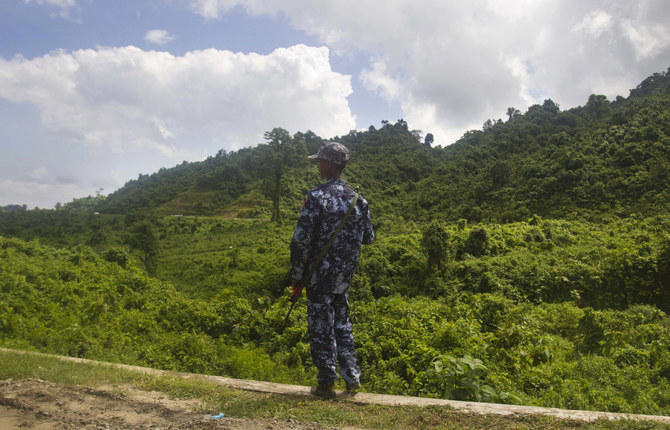
- Tens of thousands of Rohingya are estimated to have fled for safety toward neighboring Bangladesh since mid-May
NAYPVIDAW: Myanmar’s Muslim-minority Rohingya community is once again under threat of attacks and displacement as fighting between a powerful ethnic army and the country’s ruling junta escalates in the western state of Rakhine, according to UN and aid agencies.
Tens of thousands of Rohingya are estimated to have fled for safety toward neighboring Bangladesh since mid-May, which is reluctant to accept more refugees, and many of those remaining in Rakhine are in dire need of humanitarian aid.
The Arakan Army (AA) claimed control of Buthidaung town earlier in May following fighting during which the ethnic army was accused of singling out Rohingya community members. The AA denies the charges.
Reuters could not independently verify the claims, and a junta spokesperson did not respond to requests for comment.
The AA is now bearing down on the border town of Maungdaw, also home to a large Rohingya population, that the Myanmar junta will likely attempt to hold, raising the spectre of more serious violence.
“We see clear and present risks of a serious expansion of violence as the battle for neighboring Maungdaw town has begun — where the military maintains outposts and where a large Rohingya community lives,” a spokesperson for the UN High Commissioner for Human Rights said.
The Rohingya have faced decades of persecution and, after a 2017 crackdown by the military, nearly one million fled to Bangladesh, where many now live in crowded refugee camps.
Mohammed Taher, a Rohingya refugee in Bangladesh, said he had recently spoken to a friend in Maungdaw, who described the community living in fear.
“Many want to flee from Rakhine but Bangladesh is not opening its door for Rohingya,” Taher said.
Recent fighting has forced some 45,000 Rohingya to flee to an area along the Naf river on the border, according to a UN estimate.
“No Rohingya will be allowed to enter Bangladesh,” a senior Bangladesh border guard official told Reuters last week.
Myanmar has been in turmoil since a 2021 military coup, which spurred a grassroots armed resistance that is fighting the junta alongside long-established ethnic minority rebel groups.
’CAUGHT IN THE MIDDLE’
The fighting in Rakhine broke out last November when a ceasefire between the AA and the junta collapsed, leading to a string of battlefield successes for the rebels.
“Faced with mounting losses in Rakhine, the regime has resorted to arming members of the Rohingya ethnic minority to counter the Arakan Army’s advance,” Morgan Michaels of the International Institute for Strategic Studies said in a May report.
“The AA has reacted with inflammatory rhetoric and violence directed at the Rohingya.”
Amid the renewed conflict, Rohingya civilians are “increasingly being caught in the middle,” the United Nations Office for the Coordination of Humanitarian Affairs (OCHA) said in its latest report last week.
The agency estimates that over 350,000 people are displaced across Rakhine after years of conflict, many of whom do not have access to basic services.
“We are witnessing a near total absence of humanitarian assistance for communities who rely on it,” medical charity Medecins Sans Frontieres said, adding that hospitals in Buthidaung and Maungdaw were closed.
The AA, which has a goal to form an autonomous state, has warned that more battles are coming, asking civilians in Buthidaung, Maungdaw, and Thandwe to dig bomb shelters or evacuate to safer areas.
The group, which has denied it has targeted the Rohingya, has also asked for international aid for some 200,000 internally displaced people that it says are sheltering in areas under its control in Buthidaung and Maungdaw.
“The situation is incredibly fraught and dangerous,” said Scot Marciel, a former USambassador to Myanmar.
“In some ways, this is an early test of whether a post-military-rule Rakhine State with significant autonomy can work.”
33 Muslims arrested for attacking 2 Christian men on allegations of desecrating Qur’an in Pakistan
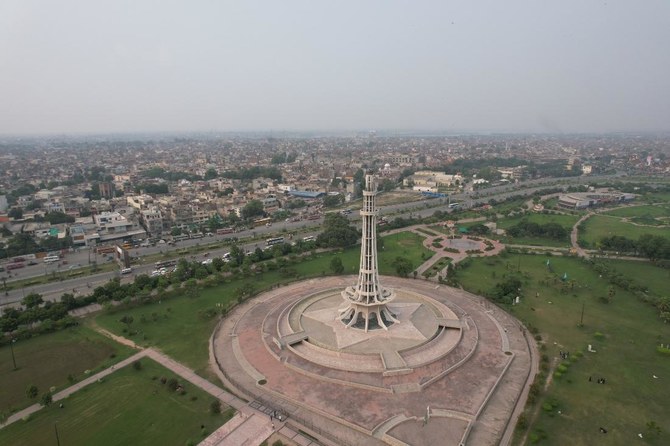
- The blaze fully incinerated the factory and parts of the house
- Blasphemy accusations are common in Pakistan and under the country’s blasphemy laws, anyone found guilty of insulting Islam or Islamic religious figures can be sentenced to death
LAHORE, Pakistan: Police in eastern Pakistan arrested dozens of Muslim men and charged them with attacking a Christian father and son on allegations of desecrating pages of Islam’s holy book, officials said Monday.
The mob went on a rampage Saturday after locals saw burnt pages of the Qur’an outside the two Christian men’s house and accused the son of being behind it, setting their house and shoemaking factory on fire in the city of Sargodha in Punjab province, said senior police officer Asad Ijaz Malhi. They also beat up the son.
Malhi said police forces rescued the two wounded men and transported them to a hospital where they were in stable condition, and that at least 33 men were arrested following multiple police raids. Authorities were chasing others who may be involved in the attack, he said.
The blaze fully incinerated the factory and parts of the house, residents and the police said.
Punjab police said in a statement it beefed up security at churches.
Blasphemy accusations are common in Pakistan and under the country’s blasphemy laws, anyone found guilty of insulting Islam or Islamic religious figures can be sentenced to death. While no one has been executed on such charges, often just an accusation can cause riots and incite mobs to violence, lynching and killings.
The latest violence, however, brought back memories of one of the worst attacks on Christians in Pakistan in August 2023, when thousands of people set churches and homes of Christians on fire in Jaranwala, a district in Punjab province.
Muslim residents at the time also claimed they saw two men desecrating the Qur’an.





